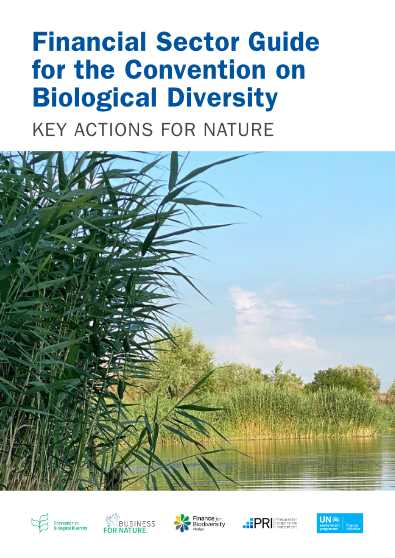New nature-positive finance guidance aims to mobilize financial institutions to engage positively with nature
The the new Financial Sector Guide for the Convention on Biological Diversity aims to mobilise financial institutions to ensure a nature positive world. As part of a collaboration between the Convention on Biological Diversity (CBD) and four partners representing businesses and the private financial sector: UNEP FI, Business for Nature, Finance for Biodiversity Pledge and the PRI, a number of UNEP FI members participated in the working group that directly contributed to the development of the guide. We would like to take this opportunity to congratulate them on their work.
The guide, which is geared towards all financial institutions, stakeholders and partners, aims to mobilise financial institutions to ensure a nature positive world, by fostering better understanding of nature’s importance for the financial sector, providing insight on the CBD process. The guide is the first of its kind between the CBD and partner organizations, and the financial sector.
Raising awareness on nature’s importance for the financial sector is becoming increasingly crucial. Continued biodiversity loss puts global economies at risk, and the financial sector, significantly exposed to nature, has a critical role to play to transform the current financial system, with a view to aligning financial flows for a nature positive world.
Members of the financial sector can contribute to curbing nature loss and aligning their financial flows to nature positive outcomes by:
- advocating and calling for an ambitious and transformative post-2020 global biodiversity framework;
- collaborating and joining the initiatives in favor of biodiversity such as the UN Environment Programme’s Finance Initiative (UNEP FI), Principles for Responsible Investment (PRI), Business for Nature and the Finance for Biodiversity Pledge
- adapting their investment strategies and engage with companies;
- assessing their risks, impacts and dependencies;
- setting targets in line with global goals and the post-2020 global biodiversity framework; and
- reporting publicly on positive and negative contributions to biodiversity by using the Taskforce on Nature-related Financial Disclosures (TNFD) or similar approaches.
The guide is particularly timely as the world presently negotiates the post-2020 global biodiversity framework, due for adoption later this year in Kunming, China.



